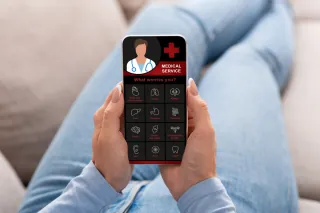
Shocking Flaws Discovered in Popular Health Apps: Researchers Demand Urgent Action!
2024-11-06
Author: Michael
A groundbreaking study from McGill University has revealed alarming design flaws in AI-powered health apps that promise quick medical diagnoses but often deliver potentially dangerous and inaccurate health advice. Researchers found that these applications are significantly hampered by biased data and inadequate regulation, raising serious concerns about user safety.
In their investigation, the researchers presented a range of symptom data from confirmed medical cases to two widely used health apps. Although these apps occasionally provided accurate diagnoses, the study, published in the Journal of Medical Internet Research, highlights a worrisome failure to identify critical health conditions. This oversight poses a dangerous risk of delayed treatment for users who rely on these tools for their health information.
The researchers pinpointed two primary issues undermining the reliability of these health apps: biased datasets and the opaque nature of artificial intelligence systems.
Bias in Data: The Hidden Risk
The phenomenon known as "garbage in, garbage out" is a critical concern with AI health applications. According to Dr. Ma’n H. Zawati, the study's lead author and an Associate Professor in McGill's Department of Medicine, these apps often learn from skewed datasets that do not adequately represent diverse populations.
This limitation means that lower-income individuals and various racial and ethnic groups are frequently underrepresented in the data, leading to assessments based on a narrow segment of users. Such biases can result in misleading medical advice and, in some cases, dangerous health recommendations. Even though most apps include disclaimers stating they do not provide professional medical advice, the interpretation of these disclaimers can vary significantly among users, potentially putting their health at risk.
The Black Box Dilemma
Another critical issue identified in the study is the “black box” nature of AI systems, in which the underlying algorithms evolve with minimal human intervention or understanding. Zawati emphasized that this lack of transparency can leave even the developers unsure of how the apps arrive at their conclusions.
With no stringent regulations in place, developers face little accountability for the outcomes of their apps. Consequently, many healthcare professionals are hesitant to endorse these tools, leaving users vulnerable to potential misdiagnosis—something that could have dire consequences.
A Clarion Call for Regulatory Oversight
To address these pressing concerns, researchers are calling for more rigorous oversight of AI health applications. Suggested improvements include training apps on diverse datasets, conducting regular audits to identify and mitigate biases, enhancing transparency to clarify algorithm decision-making processes, and incorporating greater human oversight in diagnostics.
Dr. Zawati optimistically stated, “By prioritizing thoughtful design and rigorous oversight, AI-powered health apps have the potential to enhance healthcare accessibility for the public and serve as valuable assets in clinical settings.”
This study underscores the urgent need for reevaluation and reform of health app regulations. As millions of users turn to technology for health management, it is crucial to ensure these tools are not just convenient but also safe and effective.
As the evolution of digital health continues, will regulators step forward to safeguard public health, or will users be left navigating a minefield of unreliable information? The responsibility to act could save lives.









 Brasil (PT)
Brasil (PT)
 Canada (EN)
Canada (EN)
 Chile (ES)
Chile (ES)
 España (ES)
España (ES)
 France (FR)
France (FR)
 Hong Kong (EN)
Hong Kong (EN)
 Italia (IT)
Italia (IT)
 日本 (JA)
日本 (JA)
 Magyarország (HU)
Magyarország (HU)
 Norge (NO)
Norge (NO)
 Polska (PL)
Polska (PL)
 Schweiz (DE)
Schweiz (DE)
 Singapore (EN)
Singapore (EN)
 Sverige (SV)
Sverige (SV)
 Suomi (FI)
Suomi (FI)
 Türkiye (TR)
Türkiye (TR)